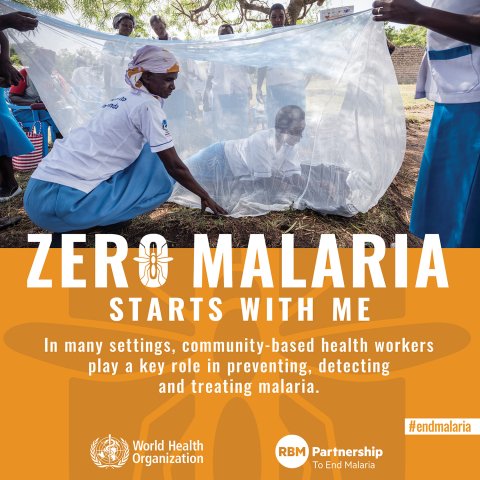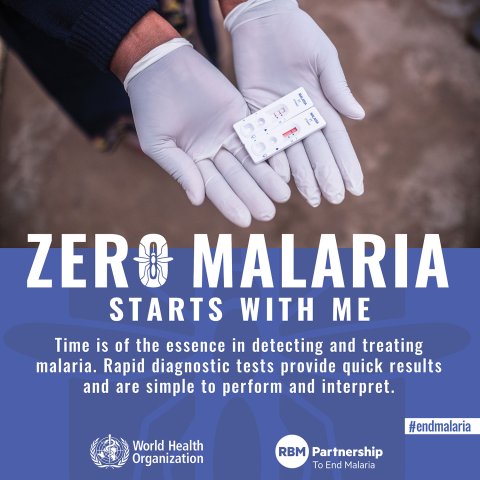World Malaria Day 2021: the push to reach zero malaria
On this year’s World Malaria Day, 25 April, the RBM Partnership to End Malaria commends the extraordinary steps that countries and their supporting partners have taken to continue in the push to reach zero malaria.
As highlighted by the World Health Organization (WHO), 24 countries have reached three or more consecutive years of zero malaria cases since 2000, with 11 of these countries also achieving malaria-free certification by WHO. We also acknowledge with appreciation the excellent coordination and decisive steps taken by the global malaria community to respond to the challenges posed by COVID-19.
This includes the actions by global partners in the development of modelling analyses and guidelines to adapt malaria prevention campaigns to the needs imposed by the COVID-19 response: changes in distribution methods, quantification and forecasting of commodities, training of service providers, and the political will to respond quickly and effectively to the ever-changing global and national context.
The projected worst-case scenario that would have seen a doubling of malaria deaths in Africa in 2020 was avoided and countries responded effectively with both creativity and determination.
However, the COVID pandemic undoubtedly impacted the ability of health systems globally to effectively diagnose and treat febrile illness, including deadly cases of malaria, which are still likely to increase due to the pandemic.
Malaria should remain a priority

As the Global Fund to Fight AIDS, Tuberculosis and Malaria recently reported, malaria case management decreased in 2020 in comparison to 2019, with malaria diagnosis falling by 31%. With COVID vaccination still at a very early stage in Africa, we expect the challenges to febrile disease management overall and to malaria diagnosis and treatment in particular to continue as areas of special concern.
Moreover, we expect increasing challenges in both external and domestic resource mobilisation as all countries work to rebuild their economies from the fallout of this pandemic, including business closures and global supply chain disruptions.
With all of this in mind, there are important reasons to make sure that the fight against malaria remains a top political and developmental priority, and one which is integrated into broader efforts to respond to and recover from the COVID-19 pandemic as well as prepare for future health challenges.
Joint messaging and an integrated approach
Across malaria endemic countries, we have already seen how malaria control programmes and the community health infrastructure they support have been leveraged in the COVID-19 response.
From community health workers in remote areas across the Greater Mekong Subregion to the heroic efforts of malaria control programme staff in the highest burden parts of sub-Saharan Africa, health systems are dealing with COVID-19 and malaria as a joint response.
Thailand’s one million village health volunteers stepped in to manage COVID-19 while continuing to drive effective malaria control activities during the outbreak.
In Zambia, the National End Malaria Council developed a joint messaging campaign to inform people about the differences in symptoms between COVID and malaria along with the appropriate information for either calling the national COVID hotline and staying at home or else presenting at a local facility as a suspected malaria case.
This type of joint messaging and integrated approach will only continue to become more important as cases rise and the vaccination efforts intensify.
Staying one step ahead

Just as we continue to hear about the challenges posed by the evolution of new COVID-19 variants, so too we need to continue to guard against the evolution of new resistant variants of the malaria parasite and of insecticide-resistant malaria mosquitoes.
Maintaining the pipeline of new malaria prevention tools, diagnostics, and therapeutics requires continuous investment to ensure that when resistance evolves, there are next-generation tools that can be deployed.
Investment in malaria research and development also requires that we continue to invest in the research infrastructure within malaria endemic countries, especially in sub-Saharan Africa, which continues to account for 94% of global malaria cases and deaths.
Even before the onset of COVID-19 and its additional strains on the global public health infrastructure, the overall level of malaria investment had already plateaued and remained insufficient to reach the critical global targets for 2025 and 2030.
Recommitment to the fight
This World Malaria Day, the RBM Partnership to End Malaria is calling for a recommitment to this fight, to harness the collective global will and solidarity that has arisen in response to the COVID-19 pandemic to make sure that we integrate our response to achieve the ultimate goal of a malaria-free world.
Ending endemic diseases like malaria is the pathway to strengthening fragile health systems and boosting resilience to better deal with current and future health threats.
This is therefore a critical time for new investment and new leadership in malaria as well as in epidemic preparedness overall.
